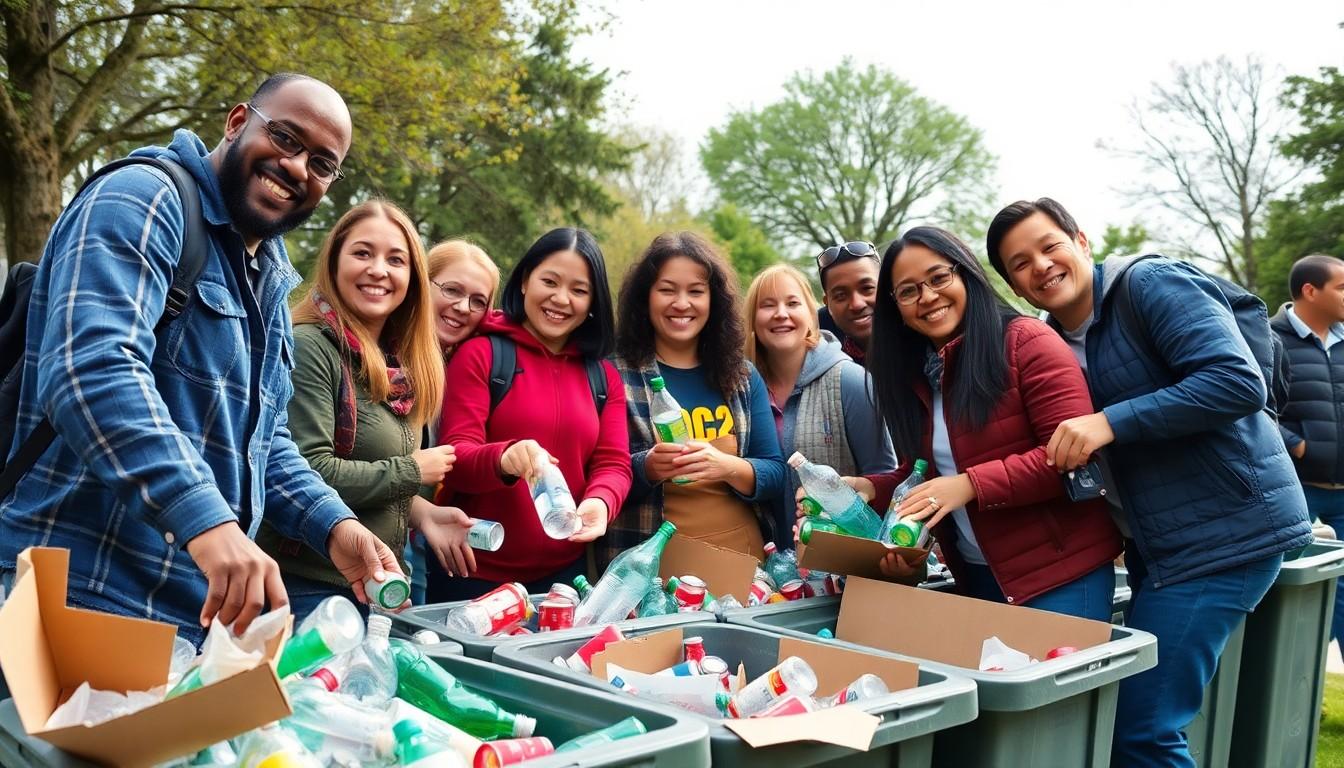In a world where plastic seems to breed faster than rabbits and climate change feels like that uninvited guest who overstays their welcome, sustainable living isn’t just a trend—it’s a necessity. Imagine a life where you can save the planet and still enjoy your morning coffee without guilt. Sounds dreamy, right? Well, it’s time to wake up and smell the eco-friendly coffee!
This guide to sustainable living is your roadmap to transforming everyday habits into planet-saving actions. From quirky tips on reducing waste to stylish ways to embrace minimalism, it’s packed with practical advice that won’t leave you feeling like you’re living in a cardboard box. With a dash of humor and a sprinkle of inspiration, this journey toward sustainability is not just manageable—it’s downright fun! So, buckle up and get ready to make Mother Earth proud while keeping your sense of humor intact.
Understanding Sustainable Living
Sustainable living focuses on reducing one’s environmental impact. It encourages adopting practices that support ecological balance and promote resource conservation.
Definition of Sustainable Living
Sustainable living refers to a lifestyle that seeks to minimize an individual’s or society’s use of natural resources. It emphasizes reducing waste, conserving energy, and choosing renewable resources. By making conscious choices, people can ensure their actions contribute positively to the environment. Actions such as using reusable bags, minimizing water consumption, and opting for public transportation exemplify sustainable living principles. It promotes a shift away from single-use products and encourages mindful consumption.
Importance of Sustainable Practices
Sustainable practices play a crucial role in addressing urgent environmental issues. They help mitigate climate change by reducing greenhouse gas emissions and decreasing pollution levels. Implementing these practices can lead to healthier ecosystems and stronger communities. Additionally, sustainable methods often enhance economic resilience by creating new jobs in renewable energy sectors and conserving resources for future generations. Prioritizing sustainability fosters a culture of responsibility toward the planet. It leads to a more balanced relationship between humans and nature.
Sustainable Living Guide

Sustainable living incorporates a few essential principles. These principles guide individuals toward making eco-friendly choices that benefit the planet.
Reduce, Reuse, Recycle
Reduce waste by opting for products with minimal packaging. Reuse items such as glass jars and tote bags, which contributes to less discard. Recycle materials like paper, plastic, and metals to divert them from landfills. Following the 3Rs promotes resource conservation and decreases environmental impact. According to the EPA, recycling and composting prevented the release of 186 million metric tons of carbon dioxide equivalent into the air in 2018. Committing to these practices not only benefits the environment but also inspires others to adopt similar habits.
Energy Efficiency
Improve energy efficiency through simple modifications in daily routines. Switch to LED bulbs, which use 75% less energy than traditional bulbs. Unplug electronics when not in use to avoid phantom energy consumption. Investing in energy-efficient appliances saves money and reduces carbon footprints significantly. According to the U.S. Department of Energy, homes consume about 22% of total U.S. energy use. Implementing energy-saving measures in homes directly contributes to a more sustainable future.
Sustainable Transportation
Choose sustainable transportation options to minimize carbon emissions. Public transportation, biking, and walking significantly reduce reliance on fossil fuels. Carpooling with others decreases the number of vehicles on the road, which lessens traffic congestion and air pollution. Electric vehicles provide a cleaner alternative to traditional cars, with the potential to decrease greenhouse gas emissions. Data from the International Transport Forum shows that shifting to public transport can reduce emissions by approximately 45%. Embracing alternative transportation methods promotes a healthier environment and enhances community welfare.
Practical Tips for Implementing Sustainable Living
Adopting sustainable living practices is essential for personal and environmental health. Here are some practical tips that can help implement these principles into everyday life.
Eco-Friendly Home Improvements
Switching to energy-efficient appliances is a significant step for reducing energy consumption at home. Installing solar panels can further decrease reliance on non-renewable energy sources. Utilizing natural materials for home renovations not only minimizes environmental impact but also promotes better air quality. Opting for non-toxic paints and finishes contributes to a healthier living environment. Incorporating smart thermostats allows for regulating heating and cooling efficiently, providing both comfort and energy savings.
Sustainable Eating Habits
Choosing locally sourced foods supports local economies while reducing transportation emissions. Incorporating more plant-based meals into the diet leads to lower greenhouse gas emissions compared to meat-heavy diets. Planning meals can minimize food waste by ensuring that groceries are used efficiently. Stocking up on seasonal produce not only promotes freshness but also often involves less pesticide use. Composting kitchen scraps closes the loop, transforming waste into valuable nutrients for gardens.
Water Conservation Techniques
Implementing low-flow fixtures reduces water usage in kitchens and bathrooms. Collecting rainwater for gardening purposes helps preserve potable water. Utilizing drip irrigation systems increases efficiency in watering plants while minimizing waste. Regularly checking for leaks can prevent significant water loss over time. Taking shorter showers can conserve both water and energy, promoting a sustainable lifestyle.
Overcoming Challenges in Sustainable Living
Individuals often face various challenges when pursuing sustainable living. Understanding these barriers leads to effective solutions.
Common Barriers to Adoption
Cost concerns rank high among common barriers. Many people perceive sustainable products as more expensive than conventional options. Limited access to eco-friendly goods also presents a significant challenge. Urban areas might offer more choices, while rural regions often lack variety. Awareness levels vary widely, too. Some individuals may not fully grasp the benefits of sustainable practices, hindering adoption. Inertia plays a role, as changing established habits can be daunting. Many struggle with conflicting information and overwhelming choices. Addressing these barriers is crucial for fostering a culture of sustainability.
Solutions and Resources
Various solutions can empower individuals to tackle these challenges. Local farmer’s markets provide affordable access to fresh, sustainable foods. Community initiatives often promote group buying, reducing costs for eco-friendly products. Online resources offer extensive educational materials, guiding sustainable choices. Workshops and webinars can boost knowledge and confidence, helping individuals adopt new practices. Local governments may support sustainability through incentives or programs. Networks of support, such as eco-friendly social media groups, foster a sense of community. Embracing these resources makes sustainable living more accessible and manageable for everyone.
Contribute to a Healthier Planet
Embracing sustainable living is a journey that everyone can undertake. By making small yet impactful changes in daily habits individuals can contribute to a healthier planet. The guide shared offers practical tips that not only reduce waste but also promote a more mindful lifestyle.
As people navigate the challenges of sustainability they’ll find that resources and community support can make a significant difference. The shift toward eco-friendly practices isn’t just beneficial for the environment; it fosters stronger communities and economic resilience.
Ultimately the commitment to sustainability is a rewarding endeavor that leads to a brighter future for generations to come.

